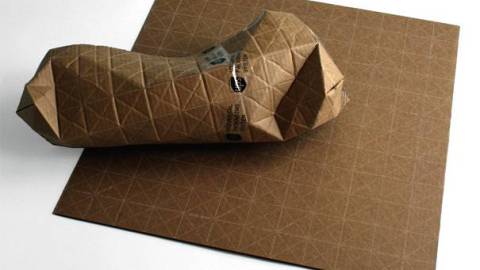Rethinking Packaging

Product packaging is one of consumerism’s most toxic byproducts — transient, temporary, and lacking the vaguely utilitarian excuse for existence that the product it contains can claim. It requires energy to make, adds to shipping weight, and is often made of polymers that linger in landfills for thousands of years. Now, designers are turning to innovative materials and engineering to revolutionize the environmental impact of packaging.
Last month, industrial designer Yves Behar (yes, him again) released Clever Little Bag. The revolutionary packaging system, developed for Puma, is the result of 21 months of research into traditional shoe boxes and systems, resulting in dramatic carbon savings.


The innovative structure replaces both the shoe box and the shopping bag, and requires 65% less cardboard than a traditional box thanks to a carbon structure die-cut from a single flat piece of material that requires no additional printing, assembly, lamination, stapling or glueing. Rather than woven, the bag portion is stitched with heat, which means less work and waste.
The new packaging system is scheduled for roll out in 2011.
Meanwhile, designer Patrick Sung created a packaging concept dubbed Universal Packaging System that can accommodate objects of almost any shape while preserving structural rigidity. It consists of a single sheet of recyclable corrugated cardboard, imprinted with a folding pattern.


While Sung’s design is still a concept (as anything featured on Yanko Design, a highly popular design blog notorious for its lack of web ethics, never offering “love links” direct to the original source and thus making the very designers featured practically unfindable in Google), it does offer a curious direction of exploration. In the midst of chemical innovations in materials, it’s interesting to explore more lo-fi, physical solutions to sustainable packaging.
Maria Popova is the editor of Brain Pickings, a curated inventory of miscellaneous interestingness. She writes for Wired UK, GOOD Magazine and Huffington Post, and spends a shameful amount of time on Twitter.




